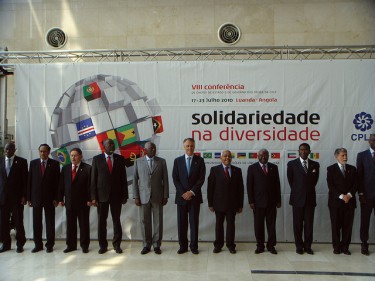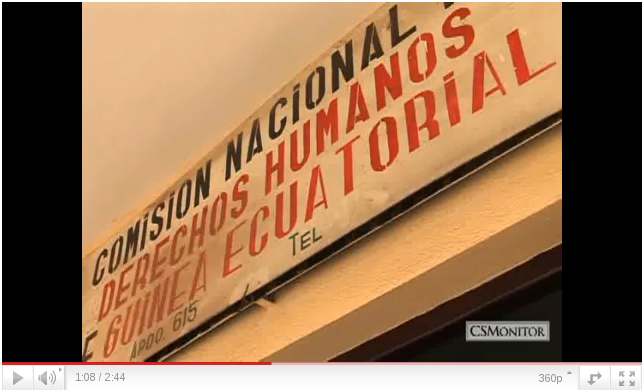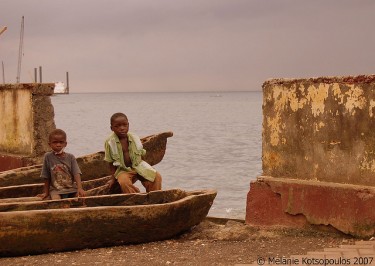This post is part of our special coverage Languages and the Internet.
In June in Angola, in the Sixteenth Ordinary Meeting of the Council of Ministers of Countries of the Portuguese Speaking Community (Comunidade de Países de Língua Portuguesa or CPLP), the membership of Equatorial Guinea to the community will be considered. A report written by the CPLP mission that visited the capital Malabo on May 4-5 will be the basis for this step in the membership process for the country governed since 1979 by Teodoro Obiang.
According to the page of the CPLP, the conditions to be proven [pt] were the effective use of the Portuguese language in the education system of the country and the orienting principles of the organization, such as “the primacy of peace, Democracy, the Rule of Law, Human Rights and social justice”.

Luanda 2010 – Eighth Meeting of Countries of the Portuguese Speaking Community. Photo by MRE Brasil on Flickr (CC BY-NC-SA 2.0)
Does language create ties?
O único território verdadeiramente humano é o da Língua. Deixemos pois este espaço livre da opressão dos interesses, deixemos comunicar as línguas, os homens, os povos.
Commented Joana Ruas, on the blog O que fica do que passa (What remains of what goes on) [pt], in an article entitled “CPLP, Guiné Equatorial Guinea & Ca; Petroleum or Platonic Love?”.
Justino Pinto de Andrade of the blog Angola Resistente [pt] tells how “the Portuguese were the first European navigators to arrive, in 1471, to the territory which today constitutes Equatorial Guinea”:
acharam a ilha de Bioko, a que depois chamaram Ilha Formosa, e também Fernando Pó. (…)
do ponto de vista histórico, houve, sim, um contacto da Guiné-Equatorial com a língua e a cultura portuguesas. Poderão, pois, ter restado ainda ténues reminiscências desse contacto, que justifiquem alguma nostalgia da língua e da cultura desaparecidas. Mas, depois, impôs-se o espanhol. A presença da língua francesa como língua oficial deve-se, sobretudo, às ligações fronteiriças que a Guiné-Equatorial tem com o Gabão e os Camarões – países francófonos – e a uma presença remota dos franceses nos seus territórios, também por ocasião do tráfico negreiro.
Brazilian journalist Michell Niero, of the blog O Patifundio [pt], adds that “Equatorial Guinea, a hispanic country, ‘speaks’ Portuguese since 2008 by decree”:
tornou[-se] membro observador mesmo com uma população ínfima falando fá d’ambô, idioma crioulo com base lexical portuguesa.
So if it isn't language, what is it that Equatorial Guinea brings to the community of Portuguese speaking countries?
The “Petrodictatorship”
In the opinion of the blog Debates e Devaneios (Debates and Daydreams) [pt] of Mozambique:
A entrada da Guiné-Equatorial como membro de pleno direito para a Comunidade dos Países (ditos) de Língua Portuguesa (CPLP) tem apenas a ver com o petróleo, sendo outras questões basilares, como a língua, a democracia e os direitos humanos uma farsa. (…) A Guiné-Equatorial é uma ditadura? É sim senhor. Mas o que é que isso importa se tem petróleo, que é um bem muito superior aos direitos humanos?
The idea is reinforced by Henrique Sousa, from the blog O que fica do que passa, for whom the membership “makes no sense”, given that it “is not a Portuguese language country” but instead a “petrodictatorship”. He agrees with writer and politician Manuel Alegre who used these same words.
The blog El Bonsai de la Información (The Information Bonsai) [es] in 2008, disdains “the historic and linguistic arguments” that convinced the “three strong members” of the CPLP – Portugal, Angola and Brazil – and described the ease with which petroleum interests drown out human rights:
Con la valiosa ayuda de Libia, autorizada por el líder Muammar Gaddafi, aliado histórico de Obiang Nguema, a inicios de este año una delegación portuguesa visitó Malabo, capital de Guinea Ecuatorial. Angola celebró los primeros convenios hace cinco años y Brasil comienza a explotar un bloque promisorio en off-shore.
The orienting principles: #FAIL
The CPLP is ruled by the principles of “the primacy of Peace, Democracy, Rule of Law, Human Rights and Social Justice” (Article 5), in an article highlighted in the CPLP website in relation to the eventual admission of Equatorial Guinea in the community.
Even in 2010, the possibility of Equatorial Guinea becoming the ninth country affiliated with the CPLP – together with Portugal, Brazil, Angola, Mozambique, Cape Verde, Guinea Bissau, São Tomé and Principe and East Timor – led to the mobilization of citizens and civil society organizations in Portuguese speaking countries against its inclusion. At issue was the disrespect for the orienting principles of the organization, as constant violations of human rights in the country are well known.

National Commission on Human Rights of Equatorial Guinea. Screenshot of a video about poverty and rights abuse amid oil wealth, on Youtube by CSMonitor100 (The Christian Science Monitor)
The petition “Guiné Equatorial na CPLP não!” (No to Equatorial Guinea in the CPLP!) [pt], created in 2010 and recently recalled in Blog 19 [pt], that of Amnesty International in Portugal, asked for the imposition of:
condições relativamente aos abusos flagrantes da liberdade de expressão e à comprovada repressão da sociedade civil do país.
The non-existence of freedom of expression, the human rights violations or the disrespect for rule of law were the subject of reports by Freedom House and of Amnesty International this year.
Celestino Bacale, of the Convergencia Para a Democracia Social (Convergence for Social Democracy) [es] the only opposition party with representation in parliament, confirmed that the regime continues to violate human rights with or without entry into the CPLP. In a press release [es], the Movement for Self Determination of the Island of Bioko, maintains that President Teodoro Obiang hopes to “injuriously use this dignified institution as a personal service that can help him to suffocate the echoes of barbarism and the human rights which he holds prisoner in his country”. And he makes an appeal:
Admitirle en la CPLP es animar al dictador guineano a seguir perpetrando daños contra los pueblos de Guinea Ecuatorial.
The decision to include the country can be concluded at the Ninth Conference of the Chiefs of State and Governments of the CPLP, to take place in Mozambique in 2012. Justino Pinto de Andrade, of the blog Angola Resistente [pt], believes that “the problem of Equatorial Guinea's entry can serve to cause a rethink of the true purpose of the CPLP”:
Que tipo de Comunidade a organização persegue: Será um qualquer modelo de integração? (…) Será a CPLP apenas um palco de concertação política e diplomática, para facilitar a tomada de determinadas posições comuns na arena internacional? Será uma via para a promoção da língua portuguesa e de culturas afins? Será um mecanismo de protecção dos interesses de cidadãos de uns países dentro dos outros países membros? Será um expediente para a facilitação da promoção de negócios?
This post is part of our special coverage Languages and the Internet.








2 comments
Why to worry?
It may be for fear that in the future the CPLP may become something like a Portuguese speaking NATO and start bombing countries in the name of humanity or for fear that it may become more like English speaking Africa?